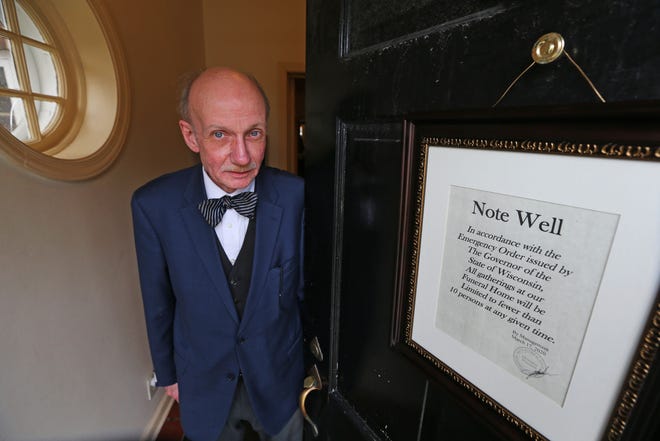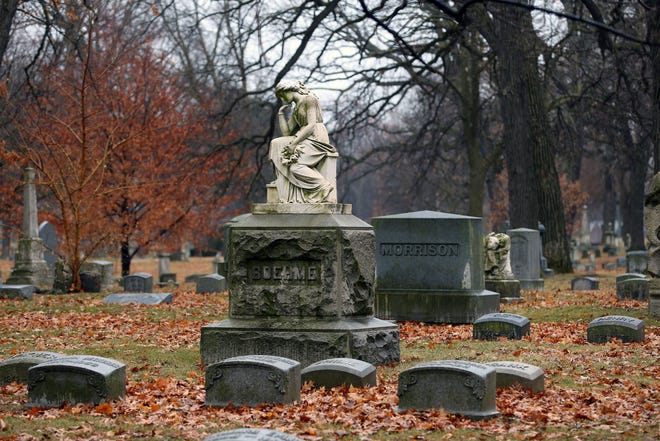Sarah HauerJohn Steppe Milwaukee Journal Sentinel 3/23/2020

MILWAUKEE – How we grieve – often by holding a large gathering to celebrate a life – is changing during the coronavirus outbreak.
As limits are placed on gatherings and businesses close, funerals are being rethought to restrict attendance.
The practice of social distancing to slow the spread of coronavirus has canceled school, postponed weddings and will alter how we hold funerals.
Funeral homes are adapting to reduced attendance for end of life celebrations and ask families to consider a smaller funeral or even wait until after the pandemic to hold a large memorial service.

"Irrespective of (the restrictions), you're going to have deaths," said John Maher, the director of Brett Funeral Home. "So we have to keep working the best that we can. ... May there be an increase? I'm afraid to say there likely will be."
Religious services will change to allow for social distancing. The Episcopal Diocese of Milwaukee is not holding funerals. Bishop Steven Miller said in a letter that "until the time of social distancing can be ended," there would be no funerals.
Miller wrote that priests could officiate at graveside services, but they should be aware of the number of attendees. Catholics in the Archdiocese of Milwaukee will still be able to hold funerals, but attendance will be limited. Rabbis will probably stop sitting shiva at someone's home in the event of a death.The Islamic Society of Milwaukee said in a letter that its mosque was closed, and funeral prayers could not be performed there. Funeral prayers could be held at a funeral home with just family members, the Islamic Society said, or preferably at the cemetery.

Burials and memorials impacted
In parts of Italy hardest hit by the virus, funerals, witnessed by a relative or two, last five minutes and end without any embraces, just the few people who were there hurrying back to their cars.
Some cemeteries don’t allow graveside services at all.
“We just take deceased up to the grave and bury them,” said Terry Harmon, owner of Chapman Funeral Home in Orange, California, where a nearby cemetery said burials would be attended by one relative and one clergy.
The Rev. Marshall Hatch, a minister in Chicago, decided to stop presiding over funerals after a service at his church attracted 400 people. In the ensuing days, as the government kept reducing the number of people allowed at public events, he couldn’t shake the memory of all those mourners hugging each other.
“I thought, ‘What did we just do?’ ” Hatch said, a day before officials in Georgia said they had evidence of an unspecified number of infections linked to two funerals.

Some funerals are delayed altogether. Country singer Reba McEntire postponed one for her mother, posting on social media that “we will continue to monitor the situation and let you know as soon as possible about future plans to celebrate her life.”
When singer Kenny Rogers died Friday, his family posted a statement that it planned a private service, with a public memorial to be held at a later date.
Virtual funerals?
Maher said he understands people's need for closure, but there are other ways to get closure than risking contracting coronavirus at a large service.
"Here's a death, and you don't want to have more of them because of a funeral," Maher said. "You don't want to take a bad situation like a death of whatever nature and make it worse."
Maher said much of Brett Funeral Home's work is done on behalf of other funeral homes, cremation or small services.
Brett Funeral Home does not have the capability of doing a virtual funeral, but Maher said he envisions people recording funerals to send to loved ones.
"We always have had visitors who have recorded it in some fashion and send it, for instance, out of the country," Maher said. "It had nothing to do with COVID-19. It was visa issues. So this has been done for a long time."
Jeff Kleczka, co-owner of Prasser-Kleczka Funeral Home in Wisconsin, said he asks people to avoid attending a funeral if they do not feel well and to consider alternatives to physical embraces such as putting a hand over one's heart or bowing.
Kleczka said that if a family wants to do a smaller ceremony right away, an additional memorial service at a later date would come "with little to no expense to them."
Prasser-Kleczka is being "even more so vigilant" in sanitizing common surfaces such as door handles and railings.
"This is the history of funeral homes and funeral service," Kleczka said. "Our profession always adapts. We always do what we have to do for the families that we help."
Contributing: Don Babwin and Amy Taxin of The Associated Press
Maher said he understands people's need for closure, but there are other ways to get closure than risking contracting coronavirus at a large service.
"Here's a death, and you don't want to have more of them because of a funeral," Maher said. "You don't want to take a bad situation like a death of whatever nature and make it worse."
Maher said much of Brett Funeral Home's work is done on behalf of other funeral homes, cremation or small services.
Brett Funeral Home does not have the capability of doing a virtual funeral, but Maher said he envisions people recording funerals to send to loved ones.
"We always have had visitors who have recorded it in some fashion and send it, for instance, out of the country," Maher said. "It had nothing to do with COVID-19. It was visa issues. So this has been done for a long time."

Jeff Kleczka, co-owner of Prasser-Kleczka Funeral Home in Wisconsin, said he asks people to avoid attending a funeral if they do not feel well and to consider alternatives to physical embraces such as putting a hand over one's heart or bowing.
Kleczka said that if a family wants to do a smaller ceremony right away, an additional memorial service at a later date would come "with little to no expense to them."
Prasser-Kleczka is being "even more so vigilant" in sanitizing common surfaces such as door handles and railings.
"This is the history of funeral homes and funeral service," Kleczka said. "Our profession always adapts. We always do what we have to do for the families that we help."
Contributing: Don Babwin and Amy Taxin of The Associated Press

No comments:
Post a Comment